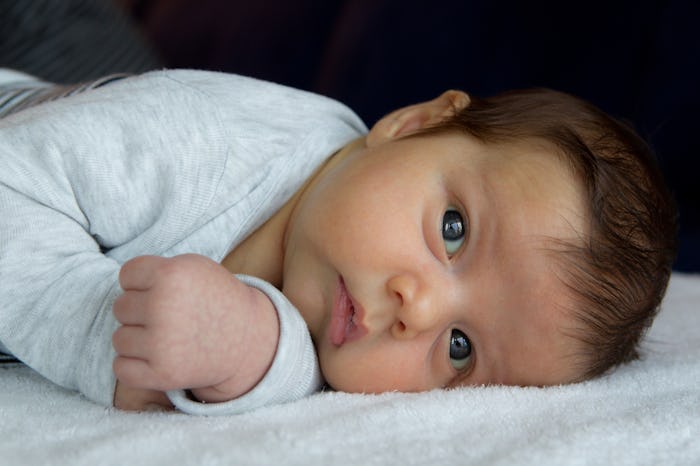Life

Here's How You Can Guess Your Baby's Eye Color, According To Science
It's nothing if not typical to spend a good portion of your pregnancy imagining what your future child will look like. Of course, the main concern is usually their health, but it's difficult not to guess how they'll act, who they'll take after more, what color their hair will be (if they have any!). But how can you tell what color your child’s eyes might be, especially if you're not a geneticist (or have access to one)?
I remember sitting in my fifth grade science class learning about Punnett Squares — diagrams used to predict genotypes — and the British geneticist who created the famous diagram. My classmates and I were tested on how well we understood how genotypes worked, and used our own Punnett Squares to try to figure out the biology of plant breeding.
Of course, when it comes to human genetics, Punnett Squares aren’t usually the method parents turn to in order to make guesses about their children’s traits. Instead, we have “baby eye color calculators” and related quizzes and generators that help us determine the probability that our future children will develop certain traits.
The genetics of eye color is complex, given the fact that multiple genes are involved in eye color inheritance. According to researchers at the National Institutes of Health, a future baby's eye color isn't always able to be determined by the color of that baby's parents' eyes. Turns out, there are other genetic variations that can leave a baby with a very different eye color than their parents or other relatives.
There are also conditions like ocular albinism, a rare genetic disorder that causes pigment production in the yes, and heterochromia, when a person has two different eye colors, that can impact pigmentation in the eyes. In these instances, simply looking at a parent's eye color isn't going to help you determine the eye color of their future child.
For the most part, though, a baby's eye color is determined by the parents' eye color and their dominant or recessive genes, as well as the amount of melanin being produced. According to the American Academy of Pediatrics, if melanocytes, cells that form melanin, only secrete a little bit of melanin, your baby will be born with blue eyes. If the melanocytes secrete more, your baby will likely have green or hazel eyes. And, as one might guess, if the melanocytes secrete a lot of melanin, your baby will have brown eyes.
Of course, it's important to keep in mind that your baby’s eye color might change during the first several months of their life, according to the American Academy of Pediatrics, so there’s no way to be totally sure before (and sometimes even after!) they’re born.
In the end, and much like your baby's personality, you might just have to wait and see.
If you don't want to wait for your baby to be born, you can take into account your eye color and the eye colors of your close relatives, then consider probability. It’s going to be a guessing game no matter what, though, so keep that in mind. It’s not impossible for families with a long history of blue eyes to welcome a brown-eyed grandchild into the family. If both parents have blue eyes, the baby will probably have blue eyes too, for example. But if two parents have brown eyes, but a grandparent has blue eyes, there is a larger chance that the baby will have blue eyes, too.
To try and guess your future baby's eye color, you can try this Baby Eye Color Calculator from babyMed, created by Dr. Amos Grunebaum, MD, an OB-GYN practicing in New York City. The calculator breaks down the probability that your child will have a certain eye color, based on your eye color, your partner's eye color, and whether or not the genes from both are heterozygous, meaning they don't match, or homozygous, meaning they do match.
Next time you want to use your imagination to guess what color a baby's eyes will be, remember that there are so many factors that are at play. In the end, and much like your baby's personality, you might just have to wait and see.
This article was originally published on